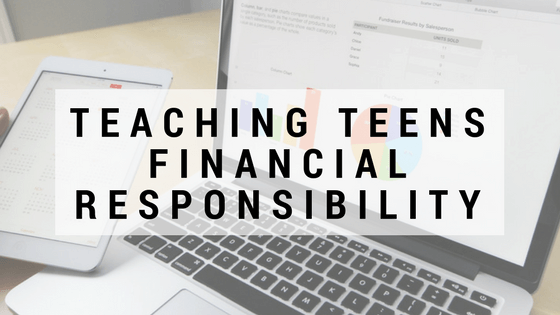Teenagers seem to care about one thing: what their peers think of them. In a world where teens are more concerned about their social media presence than their college decisions, it can be tough to navigate parenting. However, you should never skimp on teaching your children financial responsibility. With more teens in crippling financial debt than ever before, parents need to begin teaching the next generation that mismanaging money has serious consequences.
If you’re not sure where to start, begin with an allowance. Many parents give their children a weekly allowance, but it is more useful to pay them by the chore. This gives them an understanding of “more work = more pay”. The best part about paying by the chore is this can start way before your children become teenagers. Just keep in mind that not all chores are age-appropriate for younger kids.
The next step is to help your teen understand budgeting. Again, this can begin when they are younger, but it will not have as much of an impact until they are older and working outside of the house. Explain the concept of saving an emergency fund, which could be used to fix a car or buy a replacement phone if theirs is damaged. Then, allow them to decide what they should spend their money on. Make sure they account for 100% of the money they have, even if the categories are as simple as spend and save.
While you’re sitting down with your teen, take time to choose a long-term savings goal together. It may be buying a car or a laptop, or even saving for a day-trip. Whatever it is, make sure they have a set date they want to achieve this goal by. Calculate how much money they need to save each month in order to reach this goal. If your teen reaches their goal by the set date, reward them for their determination.
As teens get older, debt and credit suddenly become very important. Explain to your child the negative effects that debt can have on them (including the extra money paid to interest). Then, consider opening a joint credit card with your child. Allow them to use it, but make it their responsibility to pay, and explain the importance of maintaining a healthy credit score by paying in full and on time. If they neglect to pay their debt off every month, explain to them that you will pay up front, but you will take the money out of their allowance until you are paid back. Help them understand that poor credit can negatively impact them for decades, and help them bring their credit score to a fair-to-good level.
Teenagers may not be the most receptive to hearing about financial responsibility, but they know it is useful to understand. Although it can be easy to micromanage every aspect of your teen’s life, allow them to make some financial mistakes while they are under your roof. Encouraging them to become proactive in thinking about money will give them the confidence they need to manage other areas of their life as they transition from being a minor to being an adult. When they are able to handle tough financial situations, they will thank you for sharing your knowledge with them.
Sylvester Knox is a financial advisor specializing in wealth management. For more financial information, please visit: SylvesterKnox.net

